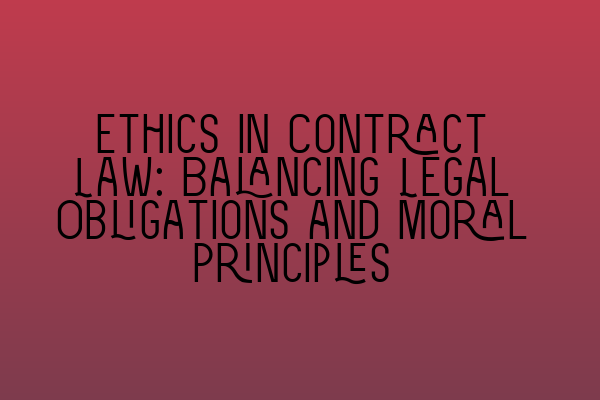As a solicitor, it is imperative to not only understand the legal obligations and principles of contract law but also to consider the ethical implications that may arise in the course of providing legal advice and representation. Contract law governs the relationships and agreements between parties, setting out their rights and obligations. However, it is essential to strike a balance between legal obligations and moral principles to ensure a fair and just outcome for all involved.
The Role of Ethics in Contract Law
Ethics in contract law refers to the moral principles and values that guide the behavior and decision-making of legal professionals in the field of contract law. While the law provides a framework for contractual relationships, it does not always address ethical considerations. This is where solicitors play a vital role in ensuring that their clients adhere to moral principles while upholding legal obligations.
In the practice of contract law, solicitors often encounter ethical dilemmas. One such situation may arise when a client asks their solicitor to draft a contract that contains unfair or unconscionable terms. While the law may not prohibit such terms, a solicitor must consider the ethical implications and advise their client accordingly. This may involve suggesting alternative, more equitable terms or even refusing to draft the contract altogether.
Another ethical aspect of contract law is the duty of disclosure. Solicitors must provide their clients with all relevant information regarding the contract, including any potential risks or unfavorable clauses. Failure to disclose such information may be unethical and could lead to legal consequences or professional misconduct complaints.
Furthermore, solicitors must navigate conflicts of interest when representing multiple parties involved in a contract. It is essential to prioritize the interests of each client and maintain their confidentiality. Disclosing sensitive information to one client that may harm the interests of another can be ethically problematic and compromise the solicitor’s duty to act in their client’s best interest.
Striking a Balance
The key to balancing legal obligations and moral principles in contract law lies in practicing good ethics. This involves considering the interests and rights of all parties involved, promoting fairness and justice, and upholding the fundamental principles of the legal profession.
When faced with a situation where legal obligations conflict with moral principles, solicitors must carefully weigh the potential consequences and choose the course of action that aligns with their ethical duties. This may involve engaging in open and honest communication with clients to address their concerns or seeking alternative solutions that are fair to all parties.
Moreover, solicitors should stay informed about changes in contract law and ethical standards to ensure they provide the most up-to-date advice and guidance to their clients. Continual professional development and engaging in discussions on ethical considerations in contract law can help solicitors enhance their knowledge and abilities to tackle complex situations effectively.
Conclusion
Contract law presents solicitors with a range of legal obligations, but it is crucial to remember that ethical considerations are equally important. Balancing legal obligations and moral principles requires solicitors to navigate complex situations, weigh potential consequences, and make informed decisions that prioritize fairness and justice. By upholding ethical standards, solicitors can protect their clients’ interests while maintaining the integrity of the legal profession.
If you are interested in learning more about contract law and preparing for the SQE exams, visit the following related articles:
